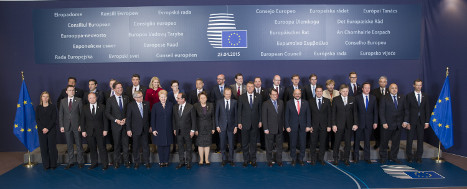On 9 March, High Representative of the Union of Foreign Affairs and Security Policy/Vice President of the European Commission Federica Mogherini addressed the United Nations Security Council, pleading for immediate and joint action by the European Union and the United Nations to confront the crisis in Libya. Unfortunately, a tragedy of immense proportions was needed as Europe’s proverbial “last straw” to finally heed Ms. Mogherini’s call and propel the EU into action. The deaths of nearly 800 migrants fleeing violence and political turmoil in search of safety on European shores on 19 April, over a month after Ms. Mogherini’s remarks in New York, prompted an emergency EU summit of the heads of state and government in Brussels on Thursday, 23 April. But the meeting is already drawing criticism as many accuse the EU of providing a quick military response to a problem that begs a comprehensive foreign policy and humanitarian solution.
Heads of state and government in Brussels agreed that Europe’s “immediate priority” is to prevent additional carnage in the Mediterranean. To this end, leaders such as David Cameron and Angela Merkel have pledged to send ships and helicopters as reinforcement. In addition, the European Council has announced expanding FRONTEX’s monthly budget for the Triton programme from €2.9 million to over €9 million, a figure which more closely resembles the amount needed to fund Italy’s now-defunct Mare Nostrum operation. The successful programme was created in response to the 2013 migrant shipwreck that killed upwards of 200 people off the coast of Lampedusa, but was dismantled in October 2014 due to the EU’s reticence to foot the bill. Furthermore, many alleged Mare Nostrum of providing a “pull factor” for asylum-seekers; they claimed it encouraged hundreds of thousands of individuals to make the treacherous journey in hopes of being rescued and provided sanctuary on European soil.
The European Council has announced expanding FRONTEX’s monthly budget for the Triton programme from €2.9 million to over €9 million, a figure which more closely resembles the amount to fund Italy’s now-defunct Mare Nostrum operation.
Additional items that have emerged from the summit include working within the domain of international law to “fight traffickers” by destroying vessels at their places of origin, combating “illegal migration flows” through increased support for African countries to bolster border control and security, and enhancing and “reinforcing internal solidarity and responsibility.” With respect to the last pledge, European leaders emphasised adherence to the Common European Asylum System and increasing aid to those countries on the frontlines, namely Italy, Greece, and Malta. The aid, however, will be provided by Member States on a voluntary basis.
The conclusions reached by the Council necessarily beckon questions of sustainability. Destroying old and weathered fishing boats hardly seems to be an effective strategy in keeping African migrants at bay, but instead may serve merely as a hasty solution for a European citizenry demanding quick answers. Many are imploring the EU to refrain from approaching the migrant crisis strictly from an emergency perspective, but also as an opportunity to architect structural changes in European migration and foreign policies. The most important change, perhaps, is rethinking legal paths for asylum seekers. Talks of resettling up to 5,000 migrants seem to fall dramatically short of an effective response, with European Commission President Jean-Claude Juncker expressing disappointment with Europe’s inability to agree on enlarging the quota. Estimates reflect more than 35,000 migrants have attempted the journey in the first four months of 2015 alone, with the latest rescue taking place off the Libyan coast on 25 April of a boat carrying nearly 230 migrants.
Talks of resettling up to 5,000 migrants seem to fall dramatically short of an effective response, with European Commission President Jean-Claude Juncker expressing disappointment with Europe’s inability to agree on enlarging the quota.
Many EU leaders find themselves walking a tight-rope between European solidarity and heeding the cries from many within Europe’s far-right parties, having risen to power on nationalist, anti-immigration platforms. The initial response coming out of Brussels may serve to stop Europe’s current haemorrhaging, but its reactive defense strategy will not likely be tolerated for long until citizens demand sustainable solutions to address the current crisis in an effective, realistic, and humane way.



